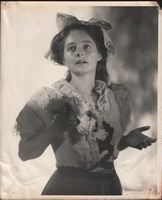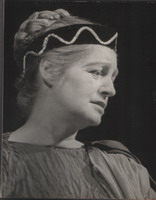|
Mechthild Harkness
This piece, author unknown, is from typed notes
found amongst the general pile of papers, which were sorted
through after Mechthild's death in 1986.

Mechthild Harkness was born in Switzerland
and emigrated with her family to the United States in 1923. From
her earliest years Eurythmy and dramatic performances were an
integral part of her daily life. At college she majored in drama
and interpretive dancing. She then worked for a time at
Daykarhanova's School for the Stage in New York. Her
interest in music led her to the Julliard Institute and the
opera department of the Mannes Music School. During the war
years she completed her training in Eurythmy whilst
participating in a variety of student opera
productions.
In 1946 she joined the company of Alan
Harkness, with which she toured the West Coast in repertory. She
also taught in the High Valley Theatre School in Ojai,
California. From 1949 to 1951 she and Alan Harkness toured
Europe with their program, Great Moments from
Shakespeare. In February of 1951 their son was born.
After the sudden death of her husband in 1952, Mechthild
created her solo performance of Sophocles' Antigone,
with which she toured America, England and Switzerland. In 1954
she became a permanent member of the acting ensemble at the
Goetheanum in Switzerland, performing, teaching and producing
over many years.

In 1967
Mechthild undertook to set up a speech and drama department at
Emerson College in Sussex, England. In 1969 she and her son
moved to Australia where she was engaged as voice coach for the
Old Tote Theatre Company. In the early 70's she recreated
her performance of Antigone for Sydney audiences. During
this time she also established her own Speech and Drama school,
work which, despite ongoing health and other difficulties, she
continued in various forms until her death in 1986.
Mechthild's legacy lives on in the creative life of
her many students. On the evening of July 28th, three nights
after her death, an informal evening service was held at The
Harkness Studio where a vigil was being kept. Among the many
offerings of poetry, music and story on that night was the
following, by student Daniel Stokes. Daniel had heard this tale
from Laurens van der Post, who in turn had heard it from an
African bushman.
A young hunter went to the village water
hole one day to quench his thirst. As he bent over the pool the
reflection of a beautiful Great White Bird appeared in the
water. He looked up quickly to catch sight of the bird, but it
had vanished. The unrest that the young hunter felt after this
experience was so great that he could no longer feel at peace
within himself, nor could he remain content with village life.
He simply had to find the bird. The journey was a long and
difficult one, until at last, as an old man, he climbed the
mountain where the Great White Bird was known to roost. Finding
that he did not have the strength to reach the summit, he fell
prey to despair. Yet in that moment he looked up, and as he did
so he noticed one small white feather floating down towards him.
He caught it in his hand and in that moment he died, content at
last. One feather from the Great White Bird was enough.
|
|